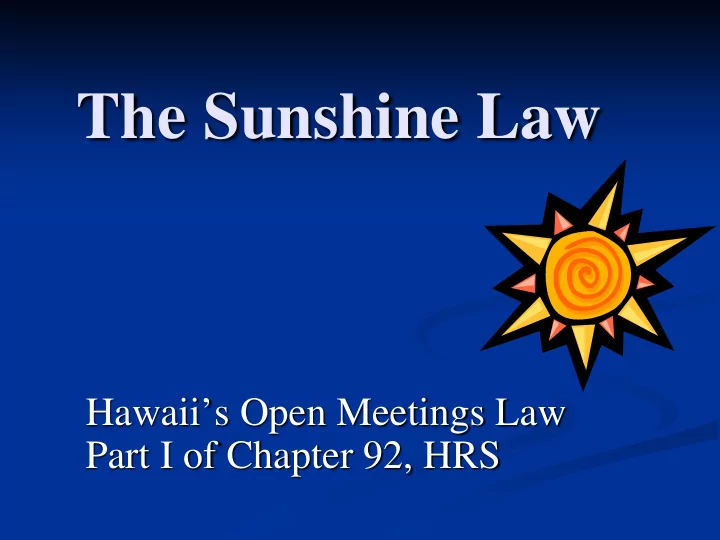

The Sunshine Law Hawaii’s Open Meetings Law Part I of Chapter 92, HRS
Board any agency, board, commission, authority, or committee of the State or its political subdivisions created by constitution, statute , rule, or executive order to have supervision, control, jurisdiction, or advisory power over specific matters and which is required to conduct meetings and to take official actions.
What’s the purpose? • Protect public’s right to know • Open governmental processes to public scrutiny and public participation
Sunshine Law requires: Discussions, deliberations, and decisions must be conducted at a public meeting Exceptions: Executive meetings Permitted interactions Limited meetings
“Board Business” Matters over which the board has supervision, control, jurisdiction or advisory power that are before the board or reasonably anticipated to come before the board in the foreseeable future
Quorum Majority of all members to which the board is entitled Must have quorum to do business (i.e., discuss, deliberate, take action) Meeting must end if quorum lost
Permitted Interactions - 2 Members Communicate privately Cannot commit to vote
No caucuses No polling No telephone discussions No e-mails No memos
Permitted Interaction Group (PIG) Less than a quorum Scope of investigation defined at a meeting Findings and recommendations presented at a 2 nd meeting Deliberation and decision-making at a 3 rd meeting
Permitted Interaction Groups Can include individuals who are not on task force
Other Permitted Interactions Present or negotiate on behalf of board Selection of officers Take testimony when no quorum Attend informational briefings Governor Department head
Chance Meeting a social or informal assemblage of two or more members at which matters relating to official business are not discussed.
Executive Meetings Closed to public 2/3 vote of board members present Announce reasons for closed meeting Vote recorded and entered into minutes
Executive Meeting Purposes to consult with board’s attorney regarding its powers, duties, privileges, immunities, & liabilities matters confidential by law or court order
Limited Meetings meeting not open to public if dangerous location, or On-site inspection & public attendance not practicable Must vote to hold limited meeting & OIP director must concur Must file & mail notice Video record unless OIP waives
Testimony All interested persons may submit written testimony on any agenda item. All interested persons may present oral testimony on any agenda item.
Notice Requirements written notice date, time, and place for executive meeting, must state purpose and cite statutory basis includes agenda
Meeting Agenda All items that the board intends to consider To inform the public of the matters before the board so that the public can decide whether to participate in the meeting
Filing Notices Filed with the Lieutenant Governor’s office and at the board’s office (posted at meeting site when feasible) 6 calendar days prior to meeting Copy mailed to anyone so requesting
State Online Calendar Executive Memorandum No. 11-11 (September 15, 2011) All State boards & commissions must file notices & agendas on State Calendar “as soon as” they are filed with LG’s office http://calendar.ehawaii.gov/calendar/html/event
Amending the Agenda Only with 2/3 vote of all members Cannot add item if: of reasonably major importance, and will affect a significant number of people
Can take agenda items out of order (no procedural requirements in Sunshine Law) Can delete or cancel items from agenda Be mindful of spirit of law
Minutes Written minutes required True reflection of matters discussed and views of participants Date, time, and place Members present/absent Substance of all matters proposed, discussed, or decided Record, by member, of votes Other information that a member requests be included
Minutes, continued… Public within 30 calendar days Executive meeting minutes may be withheld for so long as publication would defeat lawful purpose of the executive meeting
Interactive Conference Technology Meetings Teleconference, Skype, etc. Must allow interaction between all board members & public at all locations Notice where board members will be Notice must state public can attend at any location Meeting ends if audio not maintained at all locations
Emergency Meetings imminent peril to public health, safety and welfare, or unanticipated event (need AG approval) meeting in less than 6 calendar days Must file & mail notice
OIP’s Role Assist boards in complying with law Receive & resolve complaints from public Determine whether a body is subject to Sunshine Law
Court’s Role Action taken in violation of Sunshine Law = voidable by court Court can order injunction or other appropriate remedy
The Uniform Information Practices Act (Modified) Hawaii’s Public Records Law Chapter 92F, HRS
General Rule All government records are open to public inspection and copying unless restricted or closed by law
UIPA Power Points (things to remember) Records presumed public 5 exceptions to disclosure Respond in 10 business days
Need Help? Call AOD 586-1400 E-mail AOD: oip@hawaii.gov OIP Website: www.hawaii.gov/oip
Recommend
More recommend